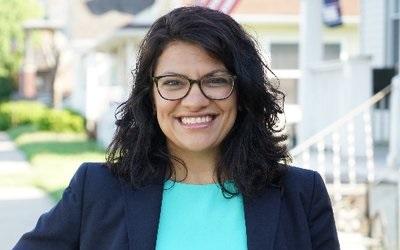You are here
- Home
- Year of Mygration
- Day 224, Year of #Mygration: American Elections reminds us that "Muslim women are not monolithic: they are more than headscarves"
Day 224, Year of #Mygration: American Elections reminds us that "Muslim women are not monolithic: they are more than headscarves"

In today’s blog post, Dr Fidèle Mutwarasibo, Visiting Research Fellow in the OU's Centre for Voluntary Sector Leadership discusses how the election of Rashida Tlaib led to celebrations in Palestine. Besides, he explores how the election of the first two Muslim Women to the US House of Representatives brings a new dawn to the debates on religiosity in US politics and beyond.
In yesterday’s post, we shared the celebrations in Ifo Refugee Camp following the election of Ilhan Omar to the US House of Representatives. Today we take a closer look at what happened in Beit Ur al-Fauqa village in the West Bank, following Rashida Tlaib's election to the US House of Representative to represent Michigan state's 13th Congressional District. Unlike Ilhan Omar, Rashida was born in the USA a year after her parents left Beit Ur al-Fauqa in 1975 to start a new life in the United States. A third of the residents in her parents’ village are members of her extended family. As one would imagine, they were delighted and joined in the celebrations of her achievements 6,000 miles away.
While one would assume that it is easier for second and successive migrant generations to settle in the country of residence, it is often the case that they face many challenges. While migrant parents struggle to secure immigration status, jobs, housing and other settlement needs, their children have to meet the challenge of being insiders and outsiders in the same vein. The need for second-generation migrants to perform normality was the subject of discussions in the November 1st blog post. The post looked at the obstacles they face in their effort to become normal, whatever being 'normal' means. Once the school and/or university days of second-generation migrants are over, those interested in getting public-facing roles, such as politicians, face additional obstacles, highlighted in Nirmal Puwar's book titled Space Invaders. Nirmal’s book explores the experiences of pioneer women and minorities occupying positions of authority previously held by members of the establishment. We don’t have to look too far in history to know who dominates the political establishment in many western democracies.
I join NBC News in the hope that the election of the first two Muslim women will help in changing the perceptions of Muslims and Arabs in the USA and beyond. Rashida became the first Muslim female member of Michigan's state legislature a decade ago. She was one of the 90 Muslims who stood in the recent US elections in the November 2018 mid-term. The election of Muslim women to the US House of Representative is going to challenge the unconscious bias of those who believe Muslim women submissive to their male spouses and partners. It will also question the unresolved issue of Muslim ban which has been going through the US courts over the last two years. Those who are fighting against the ban argue that proponents of the ban are unable to separate the tiny minority of Muslim extremists from Muslims in general. The recent ruling by the Supreme Court to uphold the revised ban has not settled the case entirely. The ban means that there are many parents whose children would emulate Rashida who will not get a chance to resettle in America and start a new life.
Islamophobia is on the rise in many countries including the United Kingdom. In Milton Keynes, the story of Ms Haji-Ali’s hate-motivated assault and the loss of her pregnancy highlights what Islamophobia can lead to at the level of the individual victim. With the elections of Muslim women, the Muslim women’s attire is going to be centre stage when Rashida and Ilhan formally take their positions in the new year. The best quotation I came across highlighting the fact that Muslim women, just like any other group, are individuals with own aspirations was that of Mona Eltahawy. She said that Muslim women are not monolithic. [They] are more than [their] headscarves. One can only hope that the elections of Muslim women set a precedent in the USA. The land of the American dream deserves a better and more rational debate on immigration, religion, citizenship and identity. Let’s hope that their achievements will move the discussion beyond the Muslim women's attire and the actions of the minority of extremists within the Muslim community. After all, there are extremists in other communities in the US and other countries.
Contact our news team
For all out of hours enquiries, please telephone +44 (0)7901 515891
Contact detailsNews & articles
Quarterly Review of Research
Read our Quarterly Review of Research to learn about our latest quality academic output.

